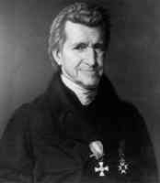
Christian Ehrenfried Weigel
Encyclopedia
Christian Ehrenfried Weigel (24 May 1748 in Stralsund
– 8 August 1831 in Greifswald
) was a German
scientist
and, beginning in 1774, a professor of Chemistry
, Pharmacy
, Botany
, and Mineralogy
at the University of Greifswald.
In 1771 he received his degree, having studied under Johann Christian Erxleben in Göttingen
. In 1806, Weigel was ennobled and carried from then on a "von
" in his name. He became the personal physician of the Swedish
royal house two years later. Among other things, Weigel developed a cooling heat exchanger (German Gegenstromkühler) (1771), which was later improved upon by Justus von Liebig
and then became to be known as the Liebig condenser (Liebigkühler). Furthermore, the Genus
Weigela
is named after him.
In 1792, he was elected a foreign member of the Royal Swedish Academy of Sciences
.
The standard botanical author abbreviation Weigel is applied to species
he described.
Stralsund
- Main sights :* The Brick Gothic historic centre is a UNESCO World Heritage Site.* The heart of the old town is the Old Market Square , with the Gothic Town Hall . Behind the town hall stands the imposing Nikolaikirche , built in 1270-1360...
– 8 August 1831 in Greifswald
Greifswald
Greifswald , officially, the University and Hanseatic City of Greifswald is a town in northeastern Germany. It is situated in the state of Mecklenburg-Vorpommern, at an equal distance of about from Germany's two largest cities, Berlin and Hamburg. The town borders the Baltic Sea, and is crossed...
) was a German
Germany
Germany , officially the Federal Republic of Germany , is a federal parliamentary republic in Europe. The country consists of 16 states while the capital and largest city is Berlin. Germany covers an area of 357,021 km2 and has a largely temperate seasonal climate...
scientist
Scientist
A scientist in a broad sense is one engaging in a systematic activity to acquire knowledge. In a more restricted sense, a scientist is an individual who uses the scientific method. The person may be an expert in one or more areas of science. This article focuses on the more restricted use of the word...
and, beginning in 1774, a professor of Chemistry
Chemistry
Chemistry is the science of matter, especially its chemical reactions, but also its composition, structure and properties. Chemistry is concerned with atoms and their interactions with other atoms, and particularly with the properties of chemical bonds....
, Pharmacy
Pharmacy
Pharmacy is the health profession that links the health sciences with the chemical sciences and it is charged with ensuring the safe and effective use of pharmaceutical drugs...
, Botany
Botany
Botany, plant science, or plant biology is a branch of biology that involves the scientific study of plant life. Traditionally, botany also included the study of fungi, algae and viruses...
, and Mineralogy
Mineralogy
Mineralogy is the study of chemistry, crystal structure, and physical properties of minerals. Specific studies within mineralogy include the processes of mineral origin and formation, classification of minerals, their geographical distribution, as well as their utilization.-History:Early writing...
at the University of Greifswald.
In 1771 he received his degree, having studied under Johann Christian Erxleben in Göttingen
Göttingen
Göttingen is a university town in Lower Saxony, Germany. It is the capital of the district of Göttingen. The Leine river runs through the town. In 2006 the population was 129,686.-General information:...
. In 1806, Weigel was ennobled and carried from then on a "von
Von
In German, von is a preposition which approximately means of or from.When it is used as a part of a German family name, it is usually a nobiliary particle, like the French, Spanish and Portuguese "de". At certain times and places, it has been illegal for anyone who was not a member of the nobility...
" in his name. He became the personal physician of the Swedish
Sweden
Sweden , officially the Kingdom of Sweden , is a Nordic country on the Scandinavian Peninsula in Northern Europe. Sweden borders with Norway and Finland and is connected to Denmark by a bridge-tunnel across the Öresund....
royal house two years later. Among other things, Weigel developed a cooling heat exchanger (German Gegenstromkühler) (1771), which was later improved upon by Justus von Liebig
Justus von Liebig
Justus von Liebig was a German chemist who made major contributions to agricultural and biological chemistry, and worked on the organization of organic chemistry. As a professor, he devised the modern laboratory-oriented teaching method, and for such innovations, he is regarded as one of the...
and then became to be known as the Liebig condenser (Liebigkühler). Furthermore, the Genus
Genus
In biology, a genus is a low-level taxonomic rank used in the biological classification of living and fossil organisms, which is an example of definition by genus and differentia...
Weigela
Weigela
Weigela is a small genus of about 12 species of deciduous shrubs in the family Caprifoliaceae, growing to 1-5 m tall. All are natives of eastern Asia. The genus is named after the German scientist Christian Ehrenfried Weigel....
is named after him.
In 1792, he was elected a foreign member of the Royal Swedish Academy of Sciences
Royal Swedish Academy of Sciences
The Royal Swedish Academy of Sciences or Kungliga Vetenskapsakademien is one of the Royal Academies of Sweden. The Academy is an independent, non-governmental scientific organization which acts to promote the sciences, primarily the natural sciences and mathematics.The Academy was founded on 2...
.
The standard botanical author abbreviation Weigel is applied to species
Species
In biology, a species is one of the basic units of biological classification and a taxonomic rank. A species is often defined as a group of organisms capable of interbreeding and producing fertile offspring. While in many cases this definition is adequate, more precise or differing measures are...
he described.

